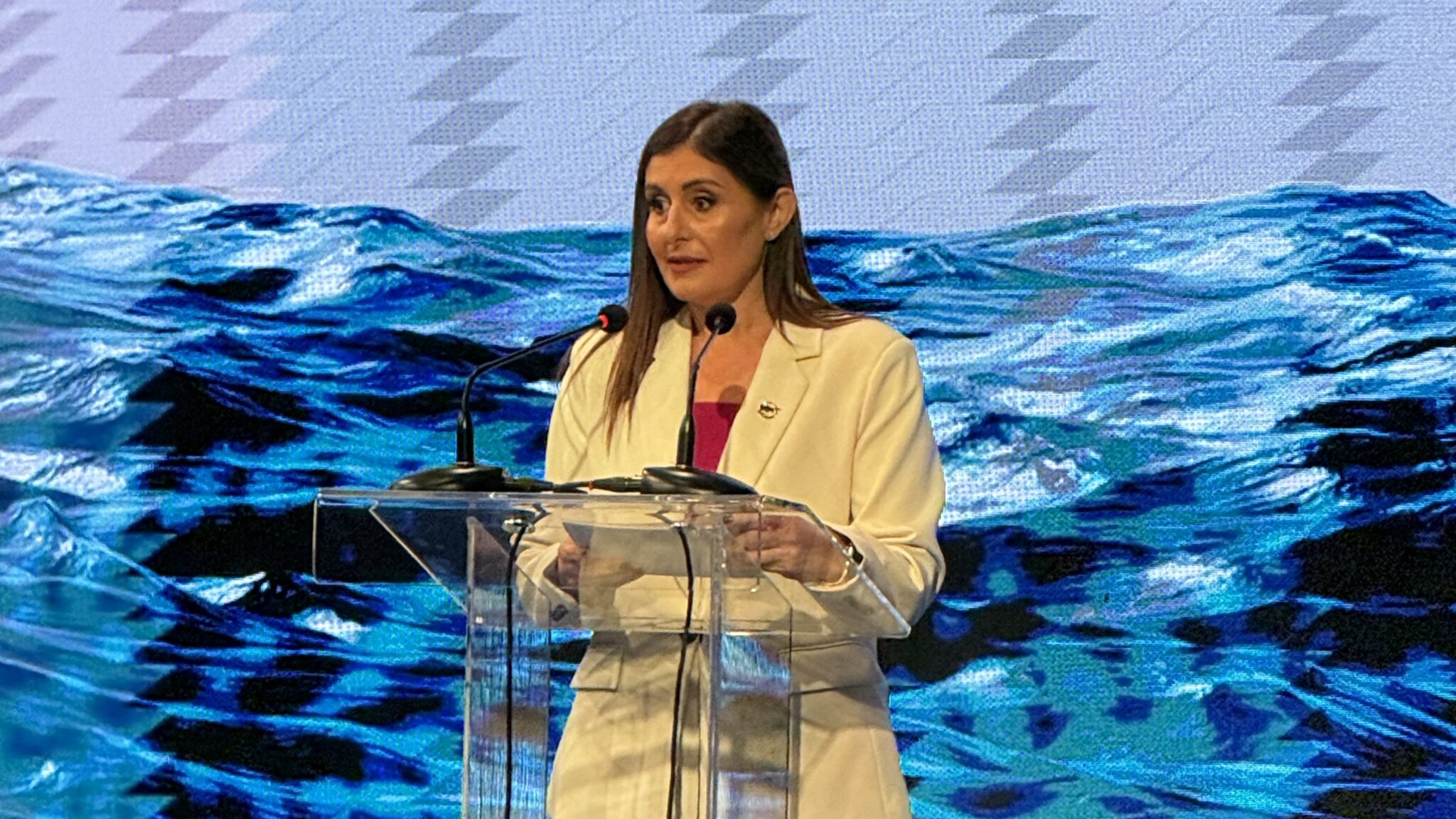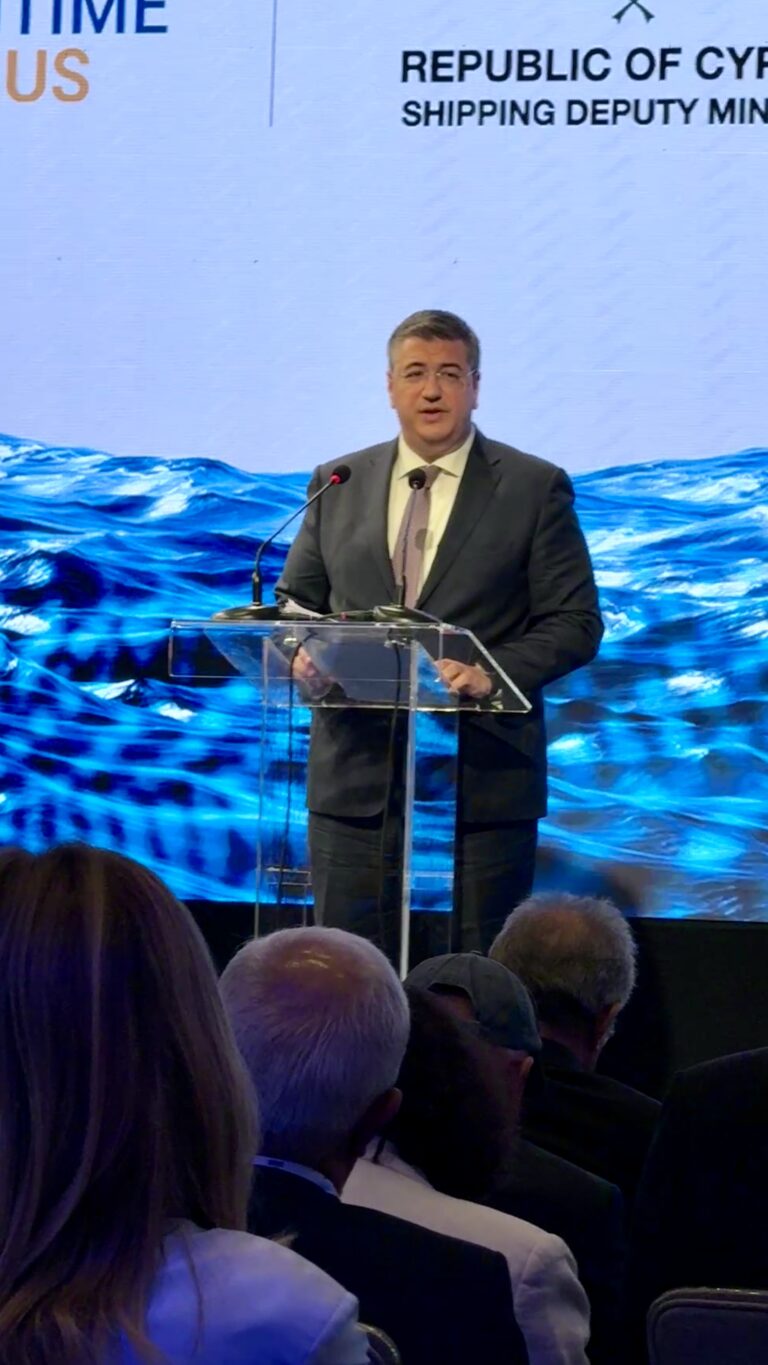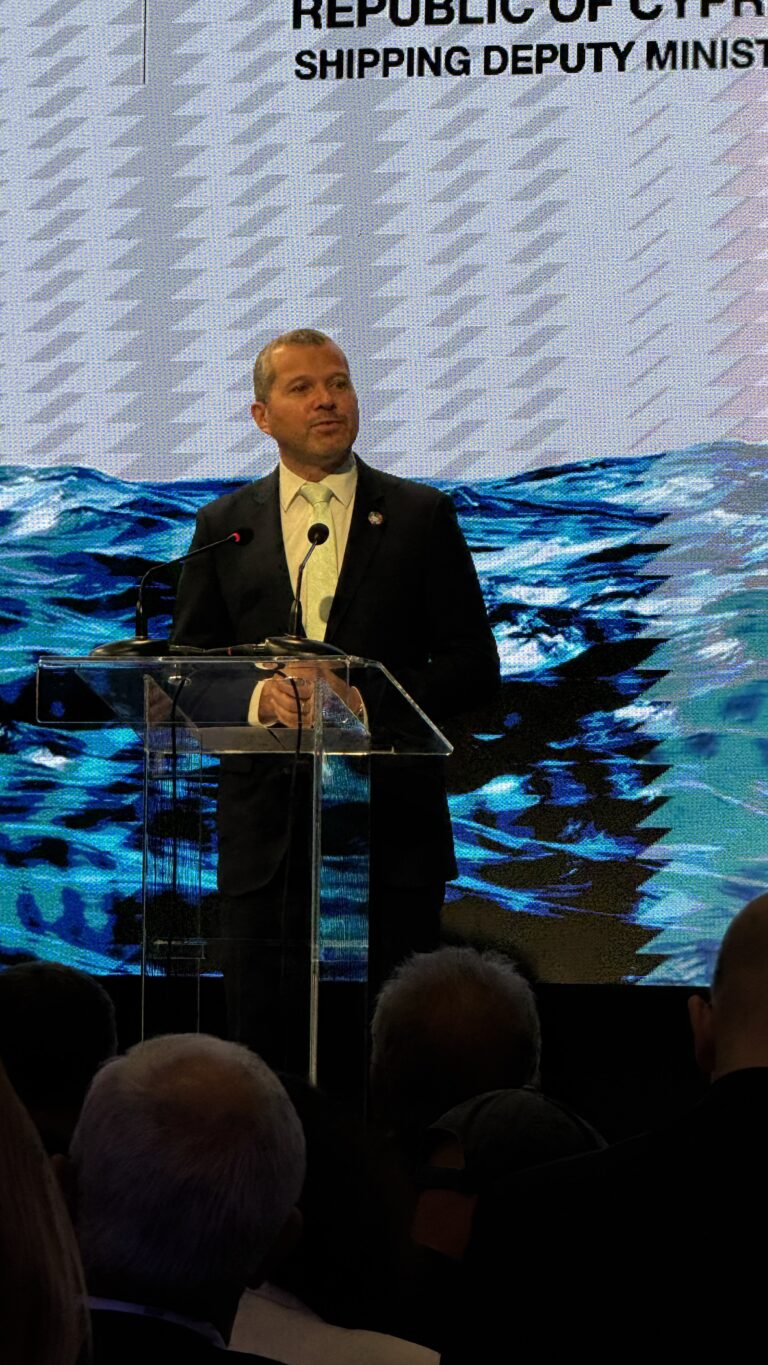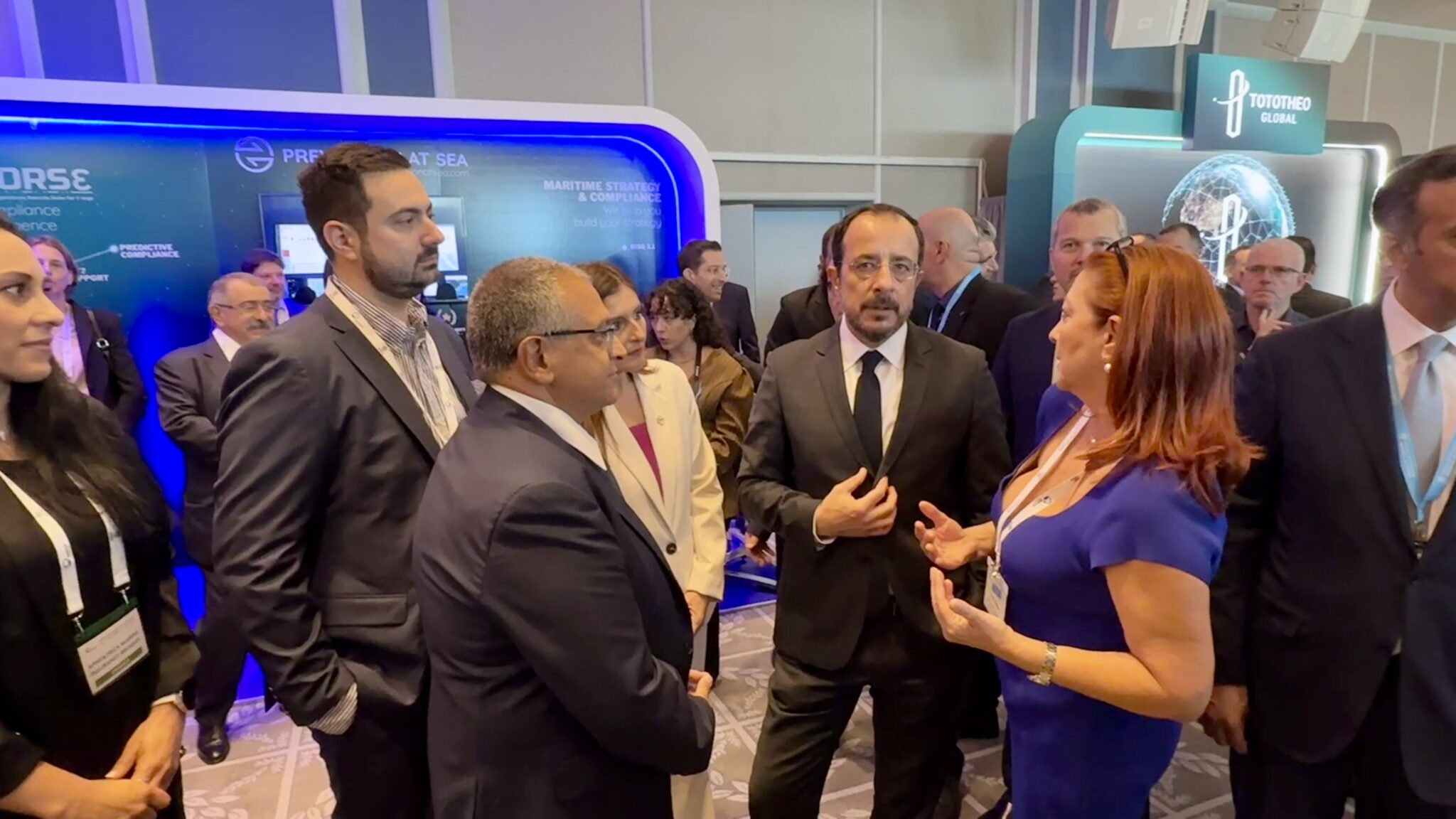The Maritime Cyprus 2025 Conference opened on Monday under the theme “Unlocking the Future of Shipping,” drawing over one thousand delegates from thirty-five countries, including heads of state, ministers, regulators, shipowners and senior industry figures.
Organised by the Shipping Deputy Ministry in cooperation with the Cyprus Union of Shipowners and the Cyprus Shipping Chamber, the three-day gathering reaffirmed Cyprus’ standing as one of the world’s leading maritime hubs and a bridge connecting regional and global shipping communities.
Opening the event, Stelios Himonas, Chairman and Permanent Secretary of the Shipping Deputy Ministry, said Maritime Cyprus had since 1989 served as a meeting point for those who govern, regulate, innovate and navigate.
“This is where the industry’s most pressing challenges, from decarbonisation and digitalisation to geopolitical uncertainty, are confronted collectively,” he noted.
He added that this year’s edition had “broken all participation records,” reflecting its growing influence as a global platform for maritime dialogue.
Meanwhile, President Nikos Christodoulides reaffirmed the government’s commitment to maintaining competitiveness and announced that the digitalisation of services within the Shipping Deputy Ministry would officially begin next week.
According to the President, tonnage under the Cyprus flag has grown by 20 per cent in the past two years, the highest level in two decades, while the number of companies registered under the tonnage-tax system rose by 15 per cent and the shipmanagement sector’s contribution to GDP by 27 per cent.
He also confirmed Cyprus’s accession to the Hong Kong Convention for the Safe and Environmentally Sound Recycling of Ships, describing it as a further step toward sustainability.
Looking ahead to Cyprus’ upcoming Presidency of the Council of the EU, he said maritime competitiveness and sustainable growth would be key priorities.
For her part, Shipping Deputy Minister, Marina Hadjimanolis, welcomed delegates to what she called “the capital of shipping,” thanking her international counterparts from Greece, Qatar and Bahrain for joining the discussions.
She said Cyprus shipping “is defined not only by its fleet but by its people,” stressing that close collaboration between the public and private sectors has been the foundation of its success. She urged participants to “innovate, collaborate and invest in the future of shipping” to ensure the sector remains resilient.
In his address, IMO Secretary-General Arsenio Dominguez commended Cyprus for its strong alignment with IMO regulations and its leadership in green incentives and digitalisation.
According to his statement, the international community must pursue “a just and equitable transition” while working collectively to meet long-term decarbonisation goals.
Dominguez also spoke of new initiatives to improve safety and seafarer welfare, and announced the forthcoming Global Digital Strategy for Shipping, which will guide the sector’s automation and trade facilitation.
Building on this, European Commissioner for Sustainable Transport and Tourism Apostolos Tzitzikostas offered a European perspective, stressing the importance of balancing “environmental ambition with economic reality.”
He confirmed that during the Cyprus EU Presidency, the European Commission will unveil both a European Industrial Maritime Strategy and a European Port Strategy to foster innovation, fair competition, clean technologies and the development of ports as energy hubs for offshore wind and hydrogen.
He also announced a Sustainable Investment Plan to accelerate the use of alternative fuels for transport. Calling Cyprus “a global maritime force,” he said the country would play “a defining role in shaping Europe’s maritime future.”
Later, a special ministerial panel titled “Ministers at the Helm of Maritime Transformation” brought a regional perspective to the discussions.



Moderated by Cyprus Mail Business and Finance Reporter Souzana Psara, the panel included ministers from Greece, Bahrain, Qatar and Cyprus, Sheikh Abdullah bin Ahmed Al Khalifa, Minister of Transportation and Telecommunications of the Kingdom of Bahrain, Vasilis Kikilias, Minister of Maritime Affairs and Insular Policy of Greece, Sheikh Mohammed bin Abdullah bin Mohammed Al Thani, Minister of Transport of the State of Qatar, and Marina Hadjimanolis, Shipping Deputy Minister of Cyprus.
Their discussion focused on policy coordination, investment in human capital and innovation as key drivers of transformation.
Greek Minister Kikilias underlined that “Europe does not have time,” noting that decisions taken now must be “realistic in the long term for the shipping industry.”
He stressed the need for sustainable shipping, both environmentally and economically, and said that relevant international agreements must be adapted accordingly.
On the green transition, Kikilias said that while there is consensus on the overall framework, “we want realism.”
LNG, he explained, has proven its reliability and must be used as a transitional fuel, as zero or near-zero emission fuels are not yet available to meet upcoming reduction targets.
He added that transition costs remain high and a significant portion should return to the shipping industry and its infrastructure.
Referring to the IMO framework, he said that global measures should not be punitive, but should instead provide appropriate tools that make the sector economically sustainable while contributing to global trade and employment.
“This is development, this is energy security, this is a better world,” he said, calling for collective action to adapt the IMO agreement so it serves the common interest, “not punishment, but the pursuit of sustainable shipping in all its senses, economic and environmental, with clear rules.”
Kikilias also warned that Europe lags behind the US and China in competitiveness, despite the strength of its maritime industry and workforce.
“It is a time of crisis but also of planning,” he said. Referring to the Draghi Report, he noted that although it clearly set out the steps Europe must take, “a year has passed, not much has been done. It is time for action.”
On maritime education, the Minister announced a forthcoming bill to reduce bureaucracy and re-evaluate maritime schools, both public and private, ensuring that “our children can enter and remain in the maritime sector, where jobs are secured and very well paid.”
Hadjimanolis echoed that policymakers must “decide with the industry, not for it,” while her counterparts from Qatar and Bahrain emphasised the importance of investing in human capital and innovation to keep the sector competitive and future-ready.
Following the ministerial debate, the industry’s voice took centre stage in the panel “Navigating Disruption: Steering the Shipping Industry Through Global Turbulences,” moderated by Thomas Kazakos, Secretary General of the International Chamber of Shipping.
Participants included Themis Papadopoulos, Karin Orsel, Ioanna Procopiou and Joe Kramek, who collectively called for a single, global regulatory framework under the IMO to avoid overlapping regional schemes.
According to their remarks, revenues from carbon measures should be reinvested into decarbonisation projects, with technology-neutral and achievable solutions prioritised.
Procopiou warned that penalising early adopters of LNG-fuelled ships “sends the wrong signal,” while Kramek noted that “investment capital likes opportunity, but it also likes certainty.”
As discussions continued, the day concluded with a shipowners’ panel, “Navigating Changes: Shipowners’ Insights on Industry Evolution,” moderated by George Mouskas. Greek and Cypriot shipowners, including George Procopiou, Thanassis Martinos, Semiramis Paliou, Andreas Hadjiyannis and John Coustas, shared candid views on regulation, competitiveness and decarbonisation.
While all expressed support for the green transition, they warned that excessive regulation risked prioritising taxation over progress.
Procopiou urged for “doable, not desirable” measures, while Paliou cautioned that higher costs would ultimately be borne by consumers.
Coustas said regional schemes like the EU ETS threaten competitiveness, and Martinos described the EU framework as “unfair and disruptive,” penalising non-European voyages.
Adding a national policy dimension, Energy Minister George Papanastasiou drew parallels between maritime and energy transitions.
He said Europe’s Green Deal “has sometimes moved faster than technology allows,” affecting competitiveness, and argued that the continent must keep “all energy options on the table” to ensure affordability and security.
“Energy and competitiveness go hand in hand,” he noted, warning that transitions made without viable alternatives could deepen inequality.
His remarks were welcomed by the panel as a balanced and realistic approach.
Finally, the opening day concluded with the presentation of the Cyprus Maritime Awards 2025, celebrating excellence within the national shipping industry.
The Cyprus Maritime Personality Award 2025 was presented to Danaos Shipping Company President and CEO Dr. John Coustas for his contribution to global shipping and support for the Cyprus Ship Registry. The Cyprus Shipping Industry Award 2025 went to MSC Shipmanagement Ltd. for its role in expanding Cyprus’ maritime cluster.
The award was accepted by Prabhat Kumar Jha, Managing Director and CEO of MSC Shipmanagement Ltd., who dedicated it to the company’s seafarers, shore teams and the Aponte family.
Day Two of Maritime Cyprus 2025 will continue with sessions focusing on P&I markets, shipowner perspectives, the charterers’ outlook and youth-driven innovation.






Click here to change your cookie preferences